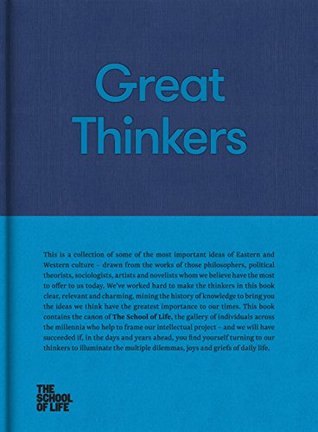More on this book
Community
Kindle Notes & Highlights
Read between
November 26, 2017 - November 30, 2019
Plato proposed that our lives go wrong in large part because we almost never give ourselves time to think carefully and logically enough about our plans. And so we end up with the wrong values, careers and relationships.
Plato showed this common sense to be riddled with errors, prejudice and superstition.
Plato also noticed how proud people were about being led by their instincts or passions (jumping into decisions on the basis of nothing more than ‘how they felt’), and he compared this to being dragged dangerously along by a group of blindfolded wild horses.
The underlying fantasy of love is that by getting close to this person, you can become a little like they are. They can help you to grow to your full potential.
Plato sees art as therapeutic: it is the duty of poets and painters (and, nowadays, novelists, television producers and designers) to help us lead good lives.
it really matters whom we admire, for celebrities influence our outlook, ideas and conduct. And bad heroes give glamour to flaws of character.
Continuous exposure to a storm of confused voices was – Plato thought – seriously bad for us, so he wanted to limit the activities of public orators and dangerous preachers. He would – nowadays – have been very sceptical about the power of mass media.
The primary thing we need to learn is not just maths or spelling, but how to be good: we need to learn about courage, self-control, reasonableness, independence and calm.
It’s fascinating and not a little sad how modern academic institutions have outlawed this ambition.
of two vices. It occupies what he termed ‘the golden mean’ between two extremes of character.
Aristotle thinks people that lack virtue should be understood as unfortunate, rather than wicked.
The task of art, as Aristotle saw it, is to make profound truths about life stick in our minds.
they believed that anxiety flourishes in the gap between what we fear might, and what we hope could, happen.
To regain calm, what we need to do is systematically and intelligently crush every last vestige of hope. Rather than appease ourselves with sunny tales, it is far better – the Stoics proposed – to courageously come to terms with the very worst possibilities – and then make ourselves entirely at home with them.
We will then realise, as Marcus Aurelius says, ‘that very little is needed to make a happy life.’
Anger is, in the Stoic analysis, caused by the violent collision of hope and reality.


